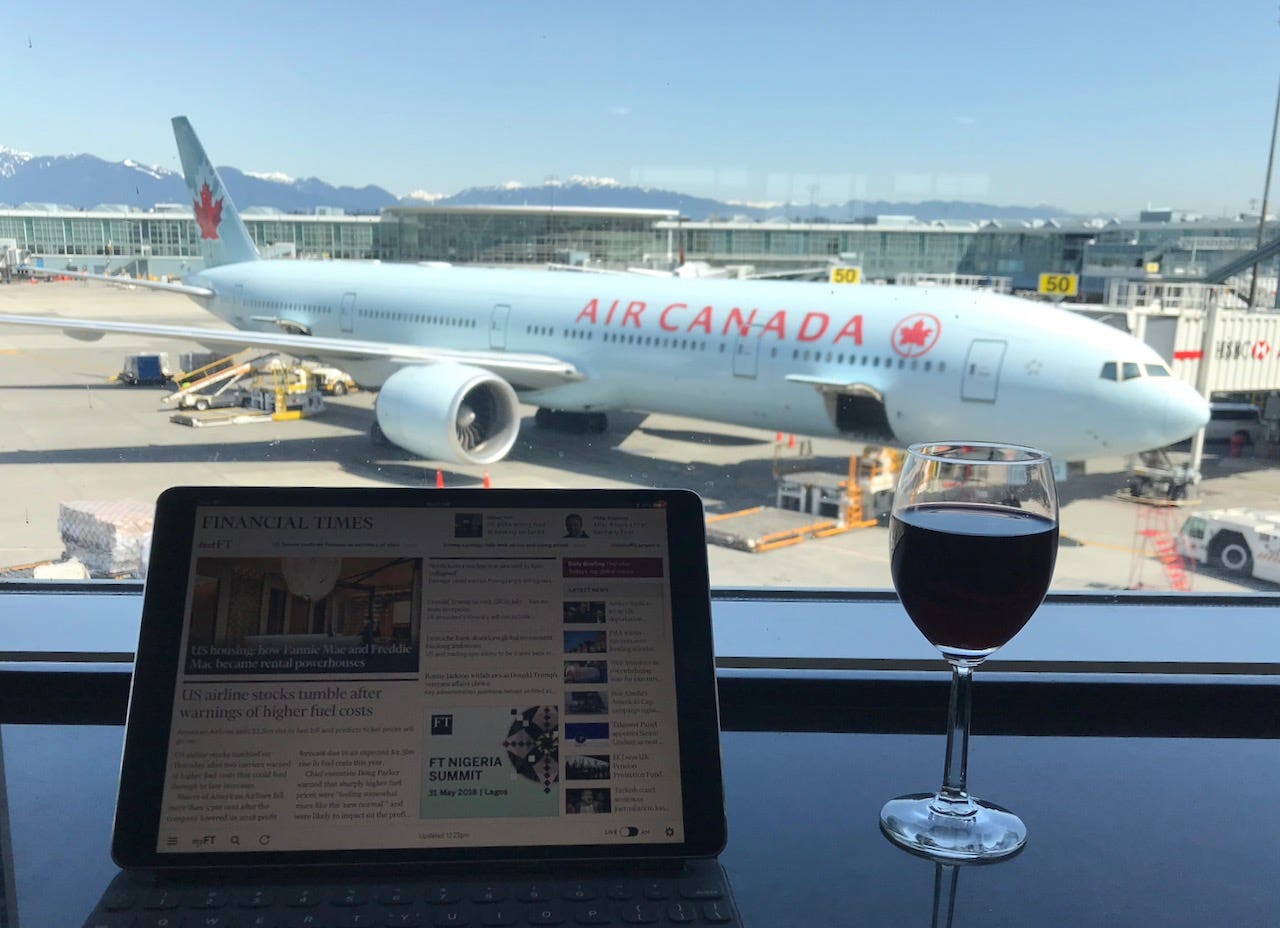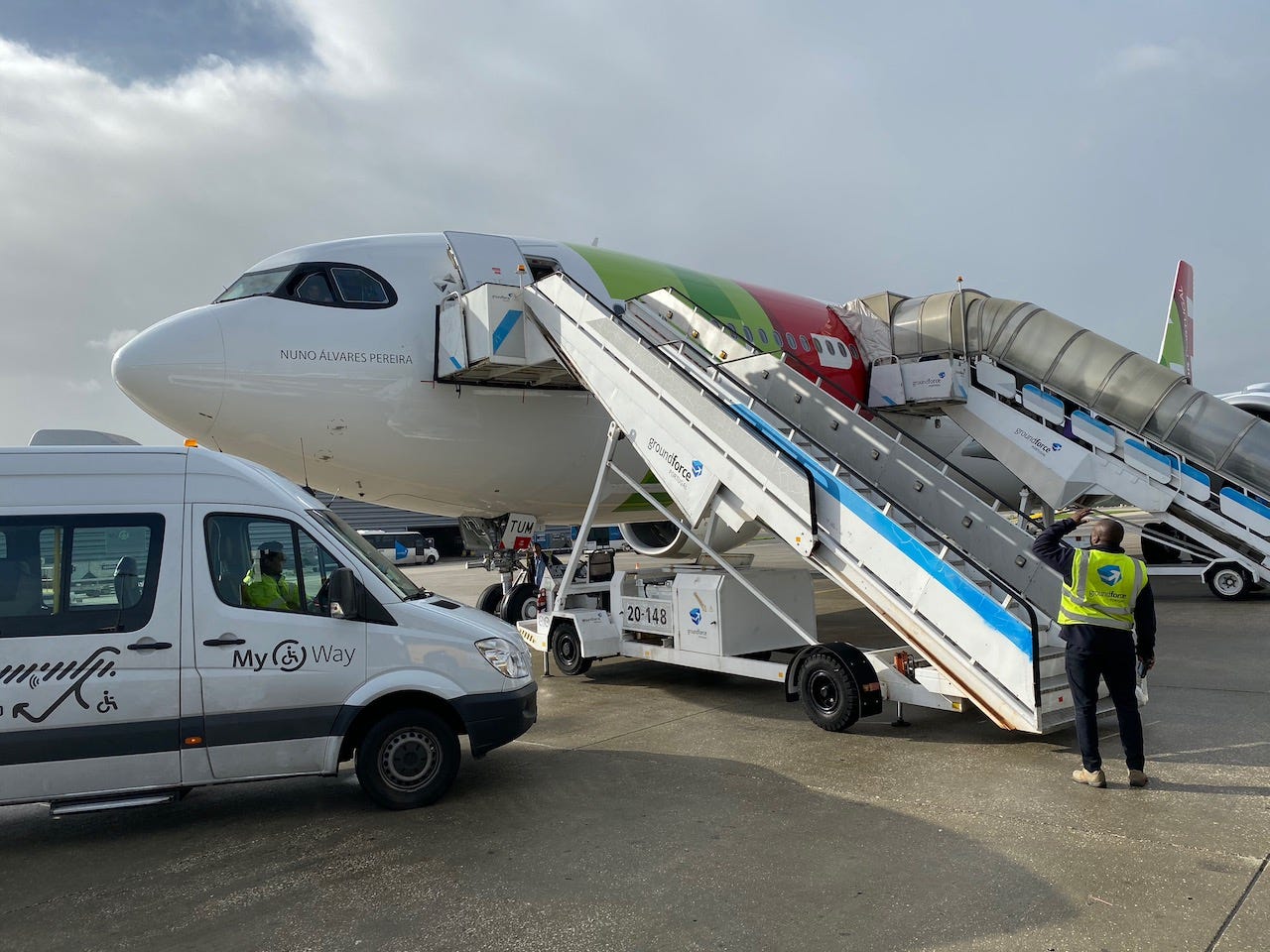New study looks at the impact of frequent flyer points
And it's not pretty. Possible, a British charity thinks they should be banned.
Ah, bliss, sitting in the Maple Leaf Lounge in Vancouver with a free glass of wine; it’s one of the benefits of having 400,000 Aeroplan points and an Aeroplan credit card. Before the pandemic and writing my book about Living the 1.5 Degree Lifestyle, I used to fly a lot to press gigs and Passivhaus conferences (like the Vancouver one in 2018) and racked up serious points. I still use the card for everything I buy, and the points keep building.
Alas, a new report from Possible, a UK-based climate charity, just released Pointless: the climate impact of frequent flyer status and those points are a powerful incentive to fly more often, longer distances, and to bump up to business class, all of which seriously increase the carbon footprint of flying.
The study found that flyers in the highest tiers of the programs generated 92.8 tonnes of CO2e (equivalent) emissions per year, or 61 times the 1.5-tonne carbon budget we need to hit by 2030.
“Our analysis found Frequent Flyer Points (FFPs) are a key part of airlines’ business model as they drive ticket sales and incentivize customers to pay for the most carbon-intensive seating options in business or first class, and to fly more than they otherwise would.”
There are two kinds of FFP programs; there are the tiers, where if you fly enough miles, you get upgrades, lounge access, and other benefits; many frequent flyers chase these, and it can become an obsession. Possible writes:
There also appears to be a sub-group of frequent-flyers for whom travel, or flying itself, or even simply points-collection, is a serious hobby. By carefully choosing purchases outside aviation that give them reward points with FFPs, and hunting for flights with favourable points redemptions, they manage to accumulate the flights - and tier points - needed to achieve “status”.
The more common FFP program is the basic rewards scheme, where points can be used for everything from seat upgrades to hotels and car rentals, goods and services and apparently, looking at my Aeroplan page today, the Ontario government-owned liquor store. These are also obsessive; even though I have only flown twice in three years and don’t have plans for flying much in the future, I still put everything I can on my Aeroplan credit card.
Possible claims that the tiered programs encourage flyers to fly longer multi-leg trips and that sometimes “members undertake ‘tier point runs’: journeys undertaken purely to build enough points to reach their target tier.” These are going to be the serious business travellers who fly a lot; I am not sure there are that many of them anymore. According to the Globe and Mail,
Overall, corporate travel is not what it used to be. And it might never come all the way back, experts say. “There is no doubt the market for classic corporate business travel has declined,” says John Grant, an analyst at aviation consultancy OAG.
But there are more points-chasers like me. “FFPs encourage flying through their rewards points, which can be collected through a variety of ‘on the ground’ consumer purchases, as well as air tickets. Redeeming these reward points allows collectors to fly more, and in more carbon-intensive passenger classes.”
I can attest to this; on my recent trip to the UK, I upgraded to a premium seat I never would have paid cash for. I will admit that pre-pandemic, I used points to upgrade to business class to get to a Passivhaus conference in Portugal.
Possible writes, “A recent study found that “on average, frequent flyers do not fly significantly shorter or longer distances than non-frequent flyers.” Perhaps that is true in Europe, but not in North America, with its “hub and spoke”airports, where using FFP can also seriously increase the distance you travel. To get back from Scotland, I couldn’t fly direct; the only flight available on points had me fly from Edinburgh to Chicago and change planes to fly back to Toronto. That meant an extra lift-off (the most carbon-intensive part of a flight) and an extra 2.5 hours in the air.
Possible complains that “point collectors often describe their activity as an addiction, an obsession or a game. Airlines have gamified high-carbon travel to support a business model predicated on social stratification.” They conclude:
“We know that FFPs cater to a small but prolific demographic of ultra-frequent flyers; we know that ultra-frequent flyers are responsible for a relatively large number of flights and share of overall emissions, and we know that FFPs are effective in encouraging their members to tailor their behaviour towards maximising points.”
But they also cater to a lot of not-so-frequent flyers who have been gamified, which is why there are so many partnerships with retailers who ask me “do you collect Aeroplan points?” These are people saving up for their dream vacation.
Possible concludes that FPP plans “encourage people to fly further, more often, and in the most carbon-inefficient seats, are antithetical to the culture and policies that we need to limit aviation emissions.”
Possible is calling for an immediate end to the offering of frequent flyer programmes by airlines operating in the UK, along with the introduction of a frequent flyer levy and a kerosene tax. This would help to reduce excessive, wasteful consumption of high-carbon travel by a small group of people, and more accurately reflect the real cost of flying for our climate.”
Cue outrage from people who complain, as they did after a 2019 Imperial College London report that called for a ban on FFP plans, that “While some people view frequent flyer programs as being elitist, the reality is that it makes travel affordable for many people.”
I’m sorry, they are elitist. Pretty much everyone who flies often is in the elite. In a previous report from Possible, Elite Status: Global Inequalities in Flying, the authors noted that in the United States, 66% of flights are attributable to just 12% of the population. In the UK, a mere 15% of the population is responsible for 70% of all flights taken. The aviation industry likes to say that at 2% of global emissions, it is not a big problem (though I believe they are a much higher proportion), but in the global picture, very few people fly often, and they are almost all in the richest 1%. My former Treehugger colleague Sami Grover thought a frequent flyer levy or tax was a good idea.
“If measures like a frequent flyer levy could be used to drive down demand among wealthy, elite frequent flyers – the shift in demand patterns would almost certainly change the economics of travel, helping alternatives such as domestic travel and/or better sleeper trains and other overland travel options to emerge.”
It’s shocking, how much cheaper flying is than the fast trains in Europe. In North America, there are few alternatives to flying- I am trying to figure out how to get from Toronto to Denver by train, and it will take me 33 hours and cost $1339, and that doesn’t include getting to Buffalo! Perhaps Sami is right; if flying wasn’t so cheap, there might be incentives to have a better rail system. Getting rid of incentives to fly like Frequent Flyer Points plans might be a good place to start.
And I had better cash my points in and get a VIA Préférence rail card!







See also the article by Stay Grounded of two years ago, which goes into great depth on those and additional problems with frequent flyer programs, here: https://stay-grounded.org/frequent-flyer-programmes-incentivise-climate-destruction/
And BTW, the 2% figure misses the big climate impacts of flying. When aviation's non-co2 climate impacts are included, it is responsible for nearly 6% of annual contributions to climate imbalance (global heating): https://stay-grounded.org/wp-content/uploads/2020/10/SG_Factsheet_Non-CO2_2020.pdf
When considering FFP people need to remember that USA/CAN programs are very different from programs for the rest of the developed world. Implementation points and rewards are handled very differently. I don't have knowledge on the North American systems so my comments are for non-NA programs.
From the very first line of their report. "driving not just ticket sales, but increased flight provision." there is very little evidence that this is true. the FFP are used to attempt you to remain with a particular set of airlines rather than to fly more. " most carbon-intensive seating options and encouraging additional flights." again there is clear evidence that people upgrade but nothing indicates that people fly more (as a general rule - there will always be outliers)
Page 6 "Publicly available research on who uses FFPs is relatively sparse. " their own words indicate why real world data is completely missing from their report. They use pretend individuals to work out values rather than read data representing real travel patterns.
Page 11 "There also appears to be a sub-group of frequent-flyers for whom travel, or flying itself, or even simply points-collection, is a serious hobby. " Here we go again more of the "appears" a cursory examination of the available literature suggest that though these people exist they are a tiny irrelevant minority which in the scale of thigs can be ~~assumed~~ ignored.
Business travel for work has died when the new normal arrived. FPP plans are becoming more limited and more restricted. I have taken to international trips the last 2 years I gained points which I have been unable to use for anything. (One way domestic trip is of no use to me). You used to be able to gateway your AirPoints into other reward programs this is no longer possible.
"I can attest to this; on my recent trip to the UK, I upgraded to a premium seat I never would have paid cash for." But you would still have taken the flight right, so most of your emissions would still have occurred.
"but in the global picture, very few people fly often, and they are almost all in the richest 1%."
So what? Why is this an issue. We are not equal we will never be equal your life is not my life is not the life of an Indian Peasant is not the life of a small African town trader. We can never be the same there will always be imbalances. Some people have advantages over others and always will have. You and I Lloyd were lucky to be born into a first world medical system. Do you claim that we should not use that system because most of the people in the world don't have a similar one?
"Getting rid of incentives to fly like Frequent Flyer Points plans might be a good place to start."
I think you would be very disappointed with the results - but why bother the programs are dying under their own weight. 5-10 years and they will be footnoted in history.